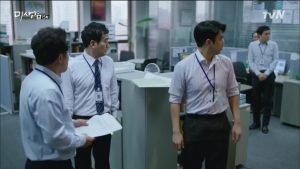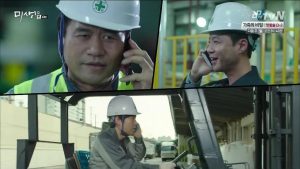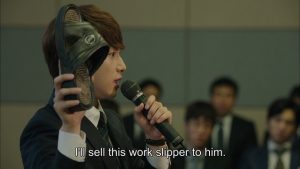Symnopsis: Episode 14: Geu-rae once again remembers that he is the only intern among his peers. He asks Oh if he can become a permanent employee. Episode 15: Geu-rae continues to work diligently despite learning he can’t become a permanent employee. He goes to town with Baek-gi on an assignment from Oh.
In the workplace, it seems very important to remain calm, and focused on tasks at hand to be professional, but that can be difficult when you have circumstances that affect your personal life. In South Korea, unless you experience tragedy such as a death in the family, it is believed that you should not let your personal life affect your performance in the workplace. When you show weakness by letting your work slack, it can be seen as affecting the efficiency of work and affect your coworker’s performance as well.
In the drama, Misaeng, we can see the character Young-yi is working diligently, to overcome the discrimination she receives from her superiors in the workplace. She seems to be managing, until we see her struggle with the responsibility of filial piety. Her mother and father calls her, begging her for money lost due to gambling, and expect her to bail them out of their debt. Young-yi is a strong and self-made woman, but we can see her visibly shaken when angrily telling off her parents, refusing to allow them to keep using her when she thought she had finally recovered after suffering in the past, paying off her father’s pervious debts. We can see that when she thought she could live her life freely, that she is tied down and held back by her parents being a burden.

The responsibility of honouring one’s parents weighs heavy on many Korean’s hearts and minds. Filial Piety is a deep-rooted Confucian tradition that carries on in Korea that three quarters of Koreans still agree with and follow. All grown children in Korea are expected to have the responsibility and obligation for their aged parents’ well-being because of the reciprocal dependence of successive generations (Lee 2015). This is changing slowly as the traditional family structure is changing into nuclear households and the rising costs of housing and education, and less elderly are relying on their children to care for them long term.
Young-yi may think she can ignore her parents’ pleas of help for financial assistance, and attempts to keep working on her project and tasks assigned to her by her resource team, butgambling can affect entire families. We can see Young-yi have substantial stress and unable to focus on her professional life as this pressure of bailing out her parents from being kicked out of their home weighs heavily on her shoulders. Her sense of filial piety is so strong she struggles to do basic tasks in the office which gets her in trouble with Manager Ma and her coworkers.


Questions:
- What do you think Ahn Young-yi should do with her parent’s pleas for another bail out? What would you do in her situation?
- Do you think Filial Piety should continue in Korea? To what extent should Filial Piety apply to situations?
Photos are screenshots from the drama, no copyright infringement is intended.
Works Cited:
Lee, Da-Young. “77% of South Koreans See Need for ‘Filial Duty Contracts’.” Korean Herald, 2015. http://www.koreaherald.com/view.php?ud=20151230001116
Kim, Won-seok, dir. Misaeng. Number 3 Pictures, 2014. https://www.netflix.com/watch/80165296?tctx=0%2C0%2C2ccd12e1-70d7-46d9-8aae-7ac139b241fa-124328052%2C%2C.


